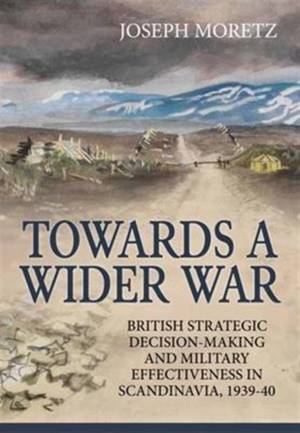
- Retrait gratuit dans votre magasin Club
- 7.000.000 titres dans notre catalogue
- Payer en toute sécurité
- Toujours un magasin près de chez vous
- Retrait gratuit dans votre magasin Club
- 7.000.0000 titres dans notre catalogue
- Payer en toute sécurité
- Toujours un magasin près de chez vous
Towards a Wider War
British Strategic Decision-Making and Military Effectiveness in Scandinavia, 1939-40
Joseph Moretz
62,95 €
+ 125 points
Description
Towards a Wider War examines British policy, grand strategy, military operations and tactical execution in the critical period of the 'Phoney War' - culminating in Scandinavia and the forlorn campaign in Norway. Recognizing that political and military leaders rarely plan for failure, the work assesses the strengths and weaknesses of British performance in the last year of peace and during the first critical months of war. Fundamentally, major problems were evidenced across the spectrum of war, but perhaps the greatest failing demonstrated remained in the higher direction of war and the mismatch between avowed strategy and operational capability. Based on official and unofficial records - and a review of the existing secondary literature - Towards a Wider War offers a reasoned and balanced assessment of British war-making at the start of the Second World War. Following a summation of the actual experience of war, the work investigates and assesses the style and manner of Britain's higher direction of war and the effectiveness of each of the services at the strategic, operational and tactical levels of war - as well as their abilities to cooperate in the joint environment. Along the way, fresh insight is offered into the centrality of economic warfare in British planning; the place of the War Cabinet in executing oversight of the war; and the workings of the Chiefs of Staff Committee and the role of the Joint Planning Committee. Of the services, the Royal Navy was most prepared for war in a European theatre in 1939. Force structure alone made this so, yet German aggression against Poland demonstrated the limitations of maritime power. Both the British Army and the Royal Air Force were undergoing major expansion programs when war arose and, for the former, it was thought three years would be required before deficiencies were alleviated. Sustaining public support during the interim was by no means assured - and in the background stood the necessity to avoid another bloodletting on the Western Front. These factors loomed large in London in late 1939 and that Italy - a presumed belligerent - had opted for neutrality painted initial strategic plans false. Increasingly, Britain (and France) looked to defeat Germany by removing her access to those commodities that made modern warfare possible: petroleum, iron ore and finance. That it increasingly appeared Nazi Germany was allied to Communist Russia only made the problem of making war more vexing. Towards a Wider War offers a unique single-volume analysis of British war-making at the pivotal beginning of the Second World War when all remained to be won -- or lost -- in the far north.
Spécifications
Parties prenantes
- Auteur(s) :
- Editeur:
Contenu
- Nombre de pages :
- 594
- Langue:
- Anglais
- Collection :
Caractéristiques
- EAN:
- 9781911096368
- Date de parution :
- 24-02-17
- Format:
- Livre relié
- Format numérique:
- Genaaid
- Dimensions :
- 163 mm x 239 mm
- Poids :
- 997 g

Les avis
Nous publions uniquement les avis qui respectent les conditions requises. Consultez nos conditions pour les avis.






